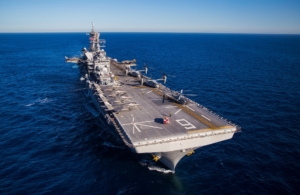
A friend of mine asked me to respond to some statements reportedly made by Tony Blair in a speech he gave entitled, “After Ukraine, What Lessons Now for Western Leadership?” The two main points being: “We are coming to the end of Western political and economic dominance” and “the biggest geo-political challenge will come from China, not Russia.” So that’s the question. Do I agree that the United States and the rest of the West need to prepare for their era of indisputable dominance to be over? The question deserves a thorough and nuanced response.
It is true that the U.S. dominated post-1945 global order is coming to an end. It was a world where the United States used its new power and leverage to create free-trade around the world that was propped up by the US dollar system and the U.S. military implicitly backing that dollar. Yes, that era is most definitely coming to an end as the world now finally has to deal with its $400 trillion dollars of debt and a fiat currency (the dollar) which is both over-inflated and being devalued annually (it’s a strong currency against others, but its value in purchasing power is declining daily and dramatically). Global currency systems only last about 50 years, and after the 1971 dropping of the gold standard, the U.S. dollar is probably entering its final years as the world’s global currency reserve. That will be a monumental change.
On the other hand, the dollar will not be replaced by the Chinese Yuan, nor will China be the world’s undisputable superpower replacing the United States. For a myriad of reasons too numerous to go into now, China is not well-positioned to be the world’s undisputed global leader. Suffice to say, that the Xi Jingping years (2013-Present), have exposed all of China’s internal weaknesses. It propped up its economy with bad loans, corruption, and extensive construction projects. It has barely made a single ally after spending more than a decade giving loans and building infrastructure for poor and emerging countries around the world. It has failed to go from an export-led economy to a consumer-based economy. It has lost the trust of foreign companies and foreign investors. The top leadership is still hopelessly divided between Xi Jingping and Jiang Zemin’s Shanghai clique. And most recently it has been dealing with collapsing banks and killer viruses. This is the tip of the iceberg and helps to show why assumptions that China will dominate the 21st Century are wrong. The greater danger is what a Chinese economic and societal collaspse could bring to the rest of the world.
Does this mean the U.S.A. is in the clear to be the dominant power? Not at all. In addition to the collapsing dollar system and its 200 trillion dollars of unpayable debt, the United States is heading into a world that is probably made up of mini-globalized regional economic blocks. The U.S., Canada, and Mexico will absolutely need to work closely together to keep their countries standard of living rising in the future. Supply-chains will still be globalized, but more localized as well. And a long period of high global inflation, a massive currency reset, the re-configuring of supply-chains, and continued environmental destruction will lead to the world’s nations to become very inward-looking for a decade, until they are forced to work more collectively.
No nation can militarily challenge the United States. The U.S. loses wars, not battles. In an all-out war with the gloves off, the U.S. wins handily and rapidly. But the U.S. tends to get bogged down in wars of half-assed occupation; which are frankly unwinnable from the start. But China is not anywhere near the U.S. in military power. It’s strongest compenent is the Chinese Navy which is only the 4th strongest in the Asia-Pacific region. China, like Russia, can only accomplish what the Western powers let it get away with. Which has tended to be a lot. If anything, the current situation in Russia and China could have been an opportunity for President Biden to put China and Russia’s constant bullying and badgering in its proper place (This could have been done by mobilizing carriers in the North Atlantic, the Mediterrenean, and Russia’s Far East, putting a military base in Poland, and moving the best fighter plans the U.S. has to Poland and Romania back in January). Just those moves alone could have neutered China and Russia for a very long time (in Russia’s case, permanently). It was a huge missed opportunity coming after 5 years in which both Russia and China had free-reign to outflank the U.S. militarily.
So we currently live in a world in which literally every country in the world is weakening either due to debt, currency collapse, demographic collapse (the big one), and/or fast-growing environmental challenges. Most “wealthy” countries are dealing with at least 3 of the 4. Most poor countries are dealing with all 4. On top of this, and often not discussed is the fact that the world is not remotely prepared to create a new energy grid without a lot of fossil fuels continuing to be used. This will not be the clean energy decade. Sadly, it will be the opposite.
Having said all that, the one country that is in the best position to emerge on top is still the United States. It has the geography, the bread-baskets, the innovative culture, the natural resources, the research facilities, the most balanced demographic situation, and the entrepreneurialism to re-invent itself and become stronger. As I pointed out in my 4th book IGWT, when the USA struggles, it is always because it is making internal, self-destructive choices (as we are now). Unlike the other countries of the world, the United States has all it needs to solve its outside problems. It just chooses not to.
One last possibility is that the multi-polar world of rival nations gets replaced by empowered global citizens that view themselves as trans-national or artifical intelligence democracies that work in concert (one world government to the conspiracy theorists). While Blair warns the world of new polarities, the current story is one where only the planet is hot, not any one country.
Patrick Nachtigall is the author of six books dealing with religion and globalization including, “In God We Trust: A Challenge to Evangelicals” and “No Religion Required, a Memoir of Faith, Doubt, Chocolate Milk, and Untimely Death.”
